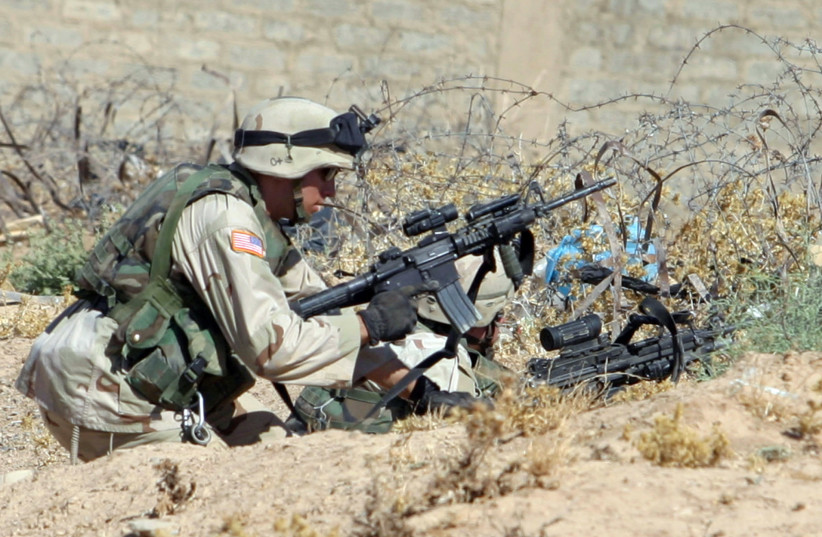This week, the Biden administration announced that the US military’s combat mission in Iraq has ended. Yet, the US will preserve some security presence in Iraq that will engage in intelligence cooperation, training, and act as advisers for the Iraqi army.
For more than a decade, Americans have been trying to get out of the Middle East. It had began in 2009 with former president Barack Obama’s decision to withdraw most of America’s 200,000 troops from Iraq. Former US president Donald Trump also withdrew American forces, this time from northern Syria.
Like the Trump and Obama administrations, the announcements over the past month are focused on fulfilling a particular mission – victory over ISIS, al-Qaeda’s heir – defeated in Iraq during the Obama era and in Syria recently.
There is no question that the international coalition has succeeded in eradicating ISIS rule. And it is still true, even though ISIS terrorist cells are currently operating on the ground in both Syria and Iraq – and perhaps even around the world.
The question is, is the danger to Middle East stability over? Have we gotten rid of the phenomenon of radical Islamism and can now build prosperous and democratic societies in the Middle East? Both Syria and Iraq even held elections.

In all the American media articles I have read, there is no mention of Iranian involvement in Iraq as a danger that must be confronted. The Washington Post even defined US President Joe Biden’s withdrawal declaration as an attempt by his administration to relieve pressure on Iranian militias.
I’m very confused. Why should pressure be reduced?
Why are Americans not concerned by Iranian involvement or takeover of the failed states in the region – Lebanon, Syria, and Iraq, as they were concerned by the ISIS takeover?
Why, in their view, are the long octopus’ arms of Sunni extreme Islamism more dangerous than the Shi’ite ones? Both extremist ideologies, unacceptable to most Muslims in the world, are completely contrary to Western values and lead to significant human rights violations and instability in countries where they have influence.
Look at Afghanistan (Sunni) as a prime example.
What will happen in Iraq?
On a practical level – there is almost no difference. The total number of American soldiers in Iraq in the past few years was only 2,500. It is not clear how many will stay according to the new mission of intelligence, training, and advice.
On a symbolic-psychological level – the message to the Iranians is clear – we handed over the key to Iraq to the Iraqi government. Good luck to them. Unfortunately, the Iraqi government, despite the goodwill of many of its members and many Iraqi citizens, has failed to rid itself of Iranian involvement in its affairs.
Only two weeks ago, Iranian suicide drones attempted to assassinate the Iraqi prime minister as they exploded over his house. The central militia in Iraq, Al-Hashd al-Shaabi, is constantly trying to undermine Iraqi independence. It operates within Iraq as a proxy for Iran, while cooperating with Iran’s other proxies in the region.
The Washington Post article ended with the following words:
In a statement Thursday, the head of Harakat Hezbollah al-Nujaba, an Iranian-aligned militia group, said its “resistance” against the coalition would continue “until the American occupation is removed from Iraq.”
So here is the bad news
Hezbollah al-Nujaba will continue to fight anyone who sees the US as a friend and any minimal American presence in Iraq. There is no debate here about ‘occupation’ – it’s an ideological clash.
On a personal level, as a mother to future soldiers – I very much understand the need of the Americans to get their soldiers out of the Middle East. Many of them lost their lives far from home and it is very difficult to explain why it’s worth it.
Yet it is important to remember – what happens in the Middle East does not stay in the Middle East.
Moreover, the current American policy is seen locally as a weakness and as a message to Iran that it is okay to continue its involvement within Iraq, Syria, and Lebanon as well. By “locally” I do not mean Israel, but the rest of the Middle East.
In conclusion, no matter what the US administration chooses to do, withdraw, or stay, it is important that the psychological and practical messages to the leaders of extremist ideologies in the Middle East, from Kabul to Tehran, are that the US will not allow extremism to harm its allies, that America will not abandon them and will fight for American interests in the region.
Such a strong message needs to be expressed consistently and clearly from every administration and there are many ways to convey it. Not all of them need to include “boots on the ground.”
The writer is the CEO and founder of Alma Research and Education Center – a nonprofit organization focused on Israel’s security challenges on the Northern borders. She is a lieutenant-colonel (ret.) and served for 15 years in the Israeli military specializing in intelligence. She holds an MA in Middle East Studies from Ben-Gurion University.
